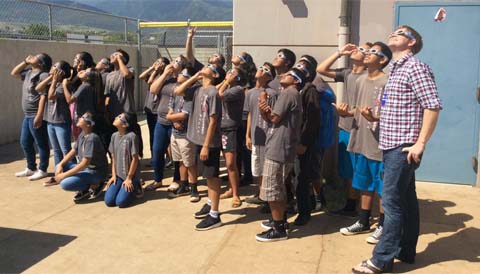Thanks to some timely NSF support, the American Astronomical Society is offering dozens of small grants to U.S. groups that offer outreach programs tied to the 2017 solar eclipse.
I'd wager that many, if not most, amateur astronomers have a deep-seated desired to teach others more about the universe and how to enjoy it. For evidence, you need look no further than the hugely successful library telescope program that's taking root across the United States.

Jessica Reed
I'd also wager that many, if not most, astronomy clubs are trying to get their collective arms around what they'll be doing — for themselves and for their communities — when the Moon takes a big bite out of the Sun on August 21, 2017.
Here's a way to help crystallize that thinking. The American Astronomical Society's Solar Eclipse Task Force has been spearheading an effort to provide accurate, high-quality information about the forthcoming eclipse via this dedicated website. (It's good stuff — pulled together by former S&T editor-in-chief and now AAS press officer Rick Fienberg.)
Now the task force has announced the availability of small grants designed to fund outreach programs and activities that use the eclipse as a springboard to a broader range of astro-activities like the underlying physical principles, the workings of the Sun, and space science more generally.
All the projects must occur in the U.S. (because the National Science Foundation is providing the funding) and must engage the public broadly in some way for the 2017 solar eclipse. So, for example, a show-and-tell at your daughter's third-grade classroom wouldn't make the cut. Nor would chartering a bus to get you and your fellow club members to the centerline.
Here are examples of the kinds of projects the task force has in mind:
- Building Sun-Moon-Earth models to explain the geometry of the eclipse at a Boys & Girls Club or similar after-school program.
- Constructing pinhole projectors or other safe observing devices at a community center or similar venue.
- Forging a partnership between a community center and your astronomy club to purchase solar telescopes and/or filters both to view the 2017 solar eclipse and to build a sustained program afterward.

AAS
Importantly (and commendably), the selection committee is looking especially for proposals that benefit underrepresented groups — women and girls, ethnic minorities, and those with disabilities — for whom science might not (yet) be a passion or a possible career choice. This funding program honors Julena Steinheider Duncombe (1911–2003), an astronomer-educator who started the first school-lunch program for underprivileged children in the U.S. and who published eclipse predictions for the U.S. Naval Observatory for many years.
"We have a total budget of $100,000 available," Fienberg tells me. "We anticipate being able to fund somewhere between 20 and 50 grants ranging in size from about $1,000 to $5,000. The exact number and amount will depend on the proposals we get and the ranking of them by the selection committee (a subcommittee of the AAS Solar Eclipse Task Force)." Winning projects will be notified by February 17th and receive their funds by the end of February.
As you might expect, the program has numerous eligibility and submission requirements, but there's nothing particularly onerous. Click here to get all the details and a submission form.
Important: You must be a nonprofit organization to be considered, and the deadline for submissions is Friday, January 13th. (Those with paraskevidekatriaphobia might want to avoid waiting until the last minute to apply.)
So please spread the word — and good luck!
 1
1
Comments
December 29, 2016 at 6:29 pm
Terrific! Many of the local community events that we are compiling have public outreach components in the days leading up to 8/21/17.
You must be logged in to post a comment.
You must be logged in to post a comment.